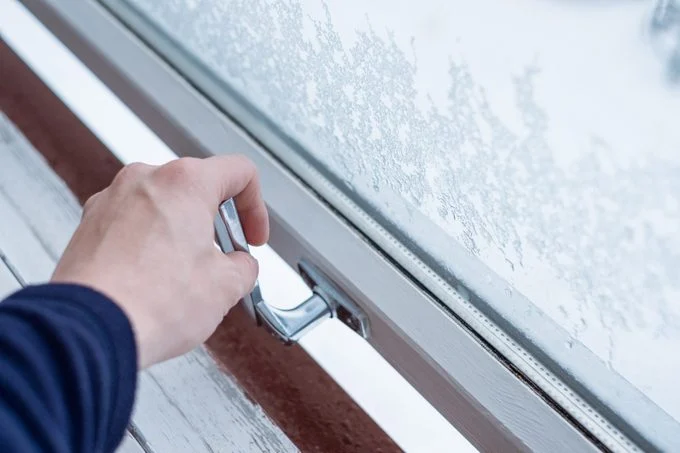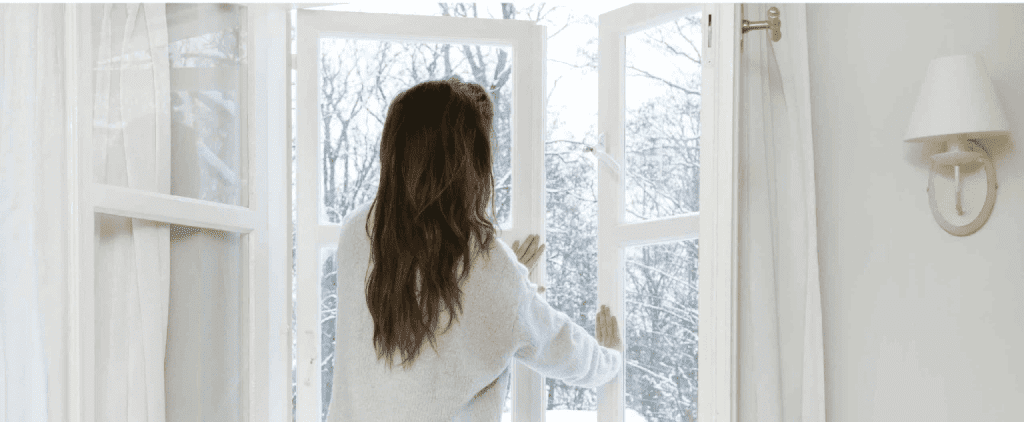On a chilly winter night, nothing seems more inviting than the warmth of a cozy home. So, imagine my surprise during a recent visit to a friend’s house, where I discovered that, despite the frosty weather, they kept a window slightly open. At first, I assumed it was an accident or oversight, but my friend explained it was intentional. This got me wondering: why would anyone let cold air in during winter? As it turns out, keeping a window open even on a frigid night is a common practice for various reasons, all aimed at creating a healthier and more comfortable indoor environment.
The Intentional Open Window: A Surprisingly Common Practice

It might seem counterintuitive to crack a window in winter, but many people do it regularly. This isn’t just an odd quirk; it’s a habit embraced by people worldwide who believe the benefits outweigh the chills. Though you might think it strange at first, there are compelling reasons behind this practice. From improving air quality to balancing humidity, there are many benefits people swear by, and some of them might surprise you.
Reasons for Keeping a Window Slightly Open in Winter
If you’ve ever questioned the logic of an open winter window, here’s the rundown on why this unusual habit persists.
1. Improving Air Circulation and Reducing Stale Air
During winter, when doors and windows are tightly shut, the air inside becomes stagnant. Without ventilation, indoor air quality can quickly deteriorate as pollutants, dust, and moisture levels rise. Keeping a window open just a crack allows fresh air to circulate, reducing stuffiness and giving the room a fresher, cleaner feel. This small trick is especially effective in houses with little natural airflow, where indoor air can become stale and even a bit suffocating.
2. Regulating Humidity and Preventing Mold Growth
Winter air can be dry, but indoor activities like cooking, showering, and even breathing add moisture to the environment. If too much humidity accumulates in a closed, unventilated space, it can lead to mold and mildew. A slightly open window allows excess moisture to escape, creating a balanced humidity level that keeps your home mold-free. This is especially helpful in bathrooms or kitchens, where humidity levels tend to be highest.
3. Health Benefits of Fresh Air and Ventilation
Breathing fresh air has well-documented health benefits, from improved respiratory function to better mental clarity. During winter, indoor air can become dense with allergens, dust, and other pollutants, which may aggravate respiratory issues or allergies. Regularly letting in some fresh air can alleviate these problems, as it replaces stale air with cleaner outdoor air. For many, the trade-off of a little chill is worth the benefits of a fresher, more breathable indoor environment.

The Risks of Keeping a Window Open on Cold Nights
Of course, there are potential downsides to consider. An open window can lead to heat loss, potentially raising energy bills as your heating system works harder to keep the room warm. There’s also the chance of creating drafts, which could lead to discomfort and, if not carefully managed, even increase the risk of catching a cold. Additionally, in urban areas with high pollution levels, an open window might introduce more particles than it removes.
So, if you’re thinking about trying this practice, balance the fresh air benefits with the possible downsides and make adjustments based on your home’s heating efficiency and insulation.
Cultural and Regional Variations: Fresh Air Preferences Around the World
Keeping a window open during winter isn’t a universally embraced practice—it varies by culture and region. In Scandinavia, for example, the value of fresh air is deeply embedded in the culture, with many people in Norway, Sweden, and Denmark opening windows in winter to encourage airflow, even in children’s bedrooms. In contrast, countries with high energy costs or extremely harsh winters may prioritize warmth and energy conservation over ventilation.
Living in a milder climate can make this practice more feasible, while those in extreme cold might find it difficult or even impractical. Still, the desire for fresh air and a well-ventilated space is a shared preference across cultures, even if the methods differ.

Expert Perspectives on Indoor Air Quality
Experts on indoor air quality often advocate for periodic ventilation, even in winter, to maintain a healthier home environment. Many suggest that air exchange is essential to remove indoor pollutants and create a healthier breathing space, but they also recommend finding a balance between fresh air and energy efficiency. Some alternatives to opening a window include using an air purifier or installing a heat recovery ventilator, which can offer the benefits of ventilation without the chill.
According to these experts, achieving good air quality doesn’t necessarily mean keeping windows wide open; even a few minutes of fresh air each day can make a noticeable difference.
Personal Preferences: It All Comes Down to Comfort
Ultimately, whether or not to open a window on a winter night is a matter of personal preference. For some, the chill is invigorating, giving them a sense of cleanliness and mental clarity. Others prioritize warmth and can’t imagine letting in a single icy draft. It’s about what makes you feel comfortable and how much you value fresh air over potential heat loss. Finding the right balance for your home might mean experimenting a bit until you find what works best.
Conclusion: Balancing Fresh Air and Warmth for a Healthier Home
While cracking open a window on a cold winter night might seem odd at first, it’s a practice with real benefits that many people stand by. Whether it’s to refresh the air, regulate humidity, or simply enjoy a bit of crispness, an open window has its advantages even during the chilliest months. So, if you’re intrigued, try it out for yourself—but remember, finding the right balance between fresh air and warmth will depend on your comfort, your home’s insulation, and your climate. With the right approach, you can enjoy the benefits of fresh air without sacrificing the cozy warmth that winter nights are all about.


